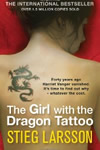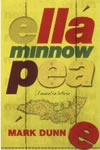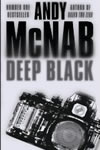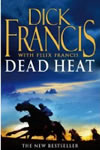« Homeward bound | Main | Poolside »
Tuesday June 30, 2009
Books in June
- The Girl with the Dragon Tattoo by Stieg Larsson, (translated by Reg Keeland)
 This is yet another much publicised book that passed me by - my friend Helen said "...have you read it yet..." as opposed to "...have you heard of...." - so I immediately went to order it from the library to find it was another 30-copy investment on their part - but still with 12 reservations outstanding. There are two further novels involving the same characters, so I had better get my name into the reservation queue...
This is yet another much publicised book that passed me by - my friend Helen said "...have you read it yet..." as opposed to "...have you heard of...." - so I immediately went to order it from the library to find it was another 30-copy investment on their part - but still with 12 reservations outstanding. There are two further novels involving the same characters, so I had better get my name into the reservation queue...
I notice there has been some criticism of the actual writing style, and a suggestion that the characters may not be fully drawn, but it did not spoil my reading of the book. Jonathan Gibbs in the Independent says if it is "a little amateurish, then perhaps that works to its advantage. This never feels like a by-the-numbers thriller."
The author was a journalist and this is his début novel. Given my devotion to Michael Connelly, I am further confirmed in my view that there is something about journalistic style in crime novels that I find particularly appealing. I say Larsson "was a journalist" since the author presented his publishers with this crime trilogy and promptly died of a heart attack. This sounded so unlikely - and since these are conspiracy-type books involving investigative journalism - I wondered if it were some kind of warped publicity stunt (début novels, died "suddenly" etc). However, all too sadly, it is true and so we also have to enjoy these books as his first and last. - Ella Minnow Pea by Mark Dunn
 This book was featured in BBC's "A Good Read" on Radio 4 in early June. It sounded so intriguing that I had to read it.
This book was featured in BBC's "A Good Read" on Radio 4 in early June. It sounded so intriguing that I had to read it.
In order to intrigue you as well I have to mention the plot:
There is a statue dedicated to an island's most famous celebrity, the (supposed) inventor of the pangram "The quick brown fox jumps over the lazy dog.". However, the sentence, which is inscribed on the statue, begins to crumble, and one by one the letters gradually fall off - so the council decides to bar islanders from using the fallen letters. Read on...
The island on which the book is set must be modelled on Tangier Island (a little like Sark in the Channel Islands) - proud to embrace an "older" style of life and proud of its isolation. The book is slightly satirical about that in itself. However, mainly it is about the dangers of political power, religious manipulation as a tool of the state, and corruption. One cannot help making the comparison with Orwell, given the linguistic distortions imposed on the islanders by the council, though this is a much more light-hearted, (nonetheless thought provoking) novel. It is a very clever book and has lots of fun as it presents itself in the form of letters, each written to conform to the new and increasingly impossible laws. - Deep Black by Andy McNab [Read by Clive Mantle]
 I read Remote Control after I found I much enjoyed listening to a couple of other McNab thrillers (read by Colin Buchanan) on OneWord Radio*. Remote Control was his first fiction book in the Nick-Stone-action-hero series and introduced us to his ward Kelly; it was very moving and his relationship with Kelly was charmingly drawn. Hence I was a bit bit disappointed to find she had been despatched somewhere along the line and this book sees Nick in a resulting slough of despond at the start. It soon picks up, of course, and the usual exciting thriller ensues.
I read Remote Control after I found I much enjoyed listening to a couple of other McNab thrillers (read by Colin Buchanan) on OneWord Radio*. Remote Control was his first fiction book in the Nick-Stone-action-hero series and introduced us to his ward Kelly; it was very moving and his relationship with Kelly was charmingly drawn. Hence I was a bit bit disappointed to find she had been despatched somewhere along the line and this book sees Nick in a resulting slough of despond at the start. It soon picks up, of course, and the usual exciting thriller ensues.
His books are very convincing, and I retain a lot of sympathy with McNab after hearing him describe his childhood "in the system" prior to joining the army. I don't mean I feel sorry for him, just that, again, everything he said rang so true of that era from my own experiences. (I should make it clear that I did not by any means have a deprived childhood, but could see many around me not so fortunate).
* OneWord Radio - the "only radio programme devoted to the spoken word" - specialised in broadcasting famous literary works, read either by the authors themselves or by well known actors; it ceased broadcasting at the beginning of 2008. - Dead Heat by Dick Francis and Felix Francis [Read by Tony Britton]
 This and other recent books published under the "Dick Francis" brand have been written with his son Felix, (and in at least one passage I can clearly hear the voice of the jump jockey's son coming through in the voice of the hero). This type of collaboration is not really a departure as he always acknowledged the heavy contributions of his wife to his previous books, even though she was never overtly credited as an author. However, this book lacked something - as much as I can narrow it down, it failed to convey the underlying threat of any real danger to the hero, and there was no sinister-villain-with-a-smile-on-his-face. I don't necessarily attribute this to being to do with the new co-authors - I remember being a little disappointed with Reflex which was written in 1980. Mostly I attribute it to being more of departure from the racing themes. There is no doubt that the racing-based novels are the best ones - and although they all seem to have a link with racing in some way, some seem less contrived than others.
The heroes always have some less than average profession, and some of the novel is spent in telling you all about that profession - somehow this works better for Francis when the description is about racing - he knows what to explain and what to assume you know.
This and other recent books published under the "Dick Francis" brand have been written with his son Felix, (and in at least one passage I can clearly hear the voice of the jump jockey's son coming through in the voice of the hero). This type of collaboration is not really a departure as he always acknowledged the heavy contributions of his wife to his previous books, even though she was never overtly credited as an author. However, this book lacked something - as much as I can narrow it down, it failed to convey the underlying threat of any real danger to the hero, and there was no sinister-villain-with-a-smile-on-his-face. I don't necessarily attribute this to being to do with the new co-authors - I remember being a little disappointed with Reflex which was written in 1980. Mostly I attribute it to being more of departure from the racing themes. There is no doubt that the racing-based novels are the best ones - and although they all seem to have a link with racing in some way, some seem less contrived than others.
The heroes always have some less than average profession, and some of the novel is spent in telling you all about that profession - somehow this works better for Francis when the description is about racing - he knows what to explain and what to assume you know.
And while we are on the theme of formula writing - his novels are written to a clear formula - explained in Wikipedia - though I beg to differ on their description of the love interests of his heroes. I always found the personal circumstances of the heroes and peripheral characters most interesting, often not revolving around simple nuclear family ideas - nor even conventional "difficult" marriages. They often express people quietly adapting their lives to their own requirements for modern living and making a go of things as best they can.
His heroes are usually very successful in what they do, and in their prime - aged around 30. And this brings me to my problem with the reader. Tony Britton is an excellent reader and I have heard him read other Francis novels... but... Even in his prime Tony Britton always sounded avuncular and mature. He just does not sound like a 30 year old, and this is accentuated by the books being written in the first person. I note that there is a version of the book read by Martin Jarvis - he is no young slip of a lad but I would be interested to hear if he sounds any more convincing.
Posted by Christina at 9:50 AM. Category: Books of the Month
